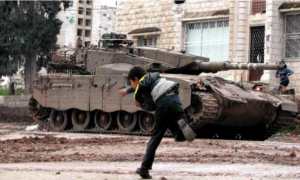‘A hidden universe of suffering’: the Palestinian children sent to jail

A Palestinian boy throwing rocks at a tank in Jenin, 2003
Nathan Thrall writes in The Guardian:
Huda Dahbour was 35 years old when she moved with her husband and three children to the West Bank in September 1995. It was the second anniversary of the Oslo accords, which established pockets of Palestinian self-government in the occupied territories. Jerusalem was still relatively open when they arrived in East Sawahre, a neighbourhood just outside the areas of Jerusalem that Israel had annexed in 1967. Huda was able to send her children to school within the city. They were under the age of 12, and Israel allowed them to enter without a special blue ID. But over time the restrictions grew, and from one day to the next Jerusalem was closed off to Palestinians by checkpoints, roadblocks and a tightening of the ever-more elaborate permit regime. On one occasion, the school bus was blocked from bringing the students home to Sawahre. Huda and half the parents of the neighbourhood spent the afternoon searching for their children, who finally showed up at sunset, after walking for several hours. Huda immediately took them out of their Jerusalem schools.
It was a fateful decision. Until then, her eldest son, Hadi, had lived up to the meaning of his name – “calm”. He was a quiet boy who rarely got into trouble. That changed when he had to start a new school, this one in Abu Dis, which was home to al-Quds University and the site of frequent clashes between local youth and Israeli soldiers. During the second intifada, the bloody 2000-2005 Palestinian uprising against the occupation, Israel cut off Abu Dis from Jerusalem by erecting an 8 metre-tall concrete wall, the “separation barrier”. It was a disaster for Abu Dis, whose businesses relied heavily on customers from the city. Shops closed, land values dropped by more than half, rental prices by nearly a third and those who could afford to moved away.
Israeli troops were stationed outside Hadi’s school practically every day. To Huda, their presence seemed designed to provoke the students so they could then arrest as many of them as possible. The soldiers would stop them on their way out of classes, line them up against the wall, frisk them and sometimes beat them, too.
In her work as a doctor with UNRWA, the UN relief and works agency for Palestinian refugees, Huda saw things that made her afraid for her sons. She had witnessed a soldier shoot a boy who threw a stone at a tank. The soldiers stopped her from going to help him as he fell to the ground.
